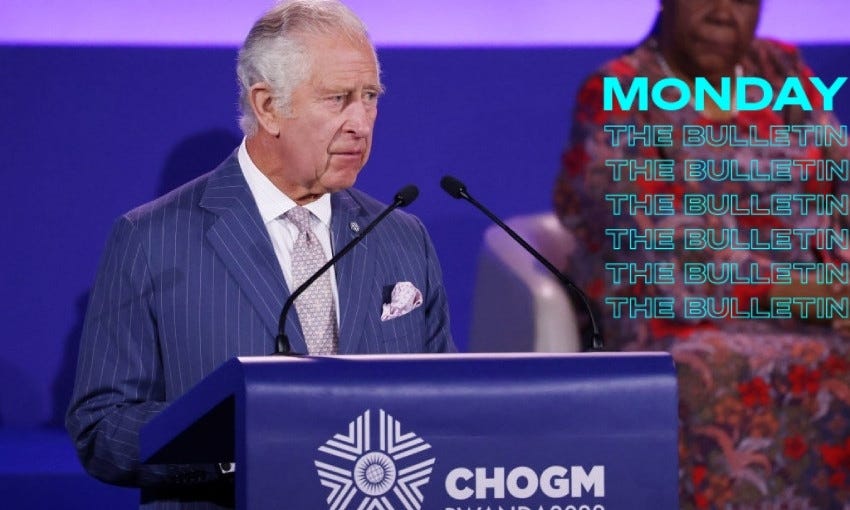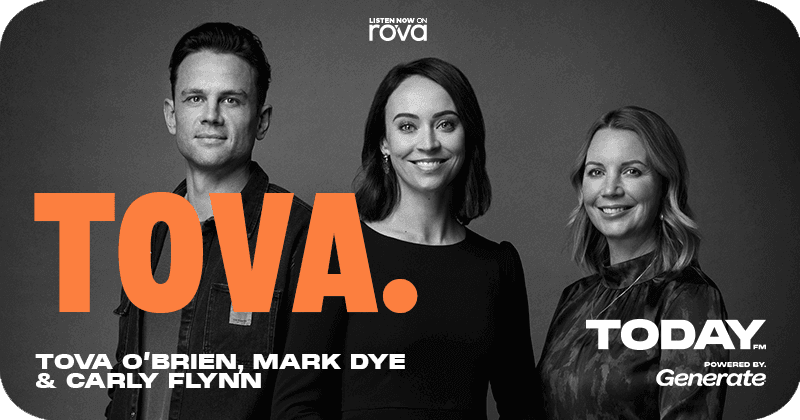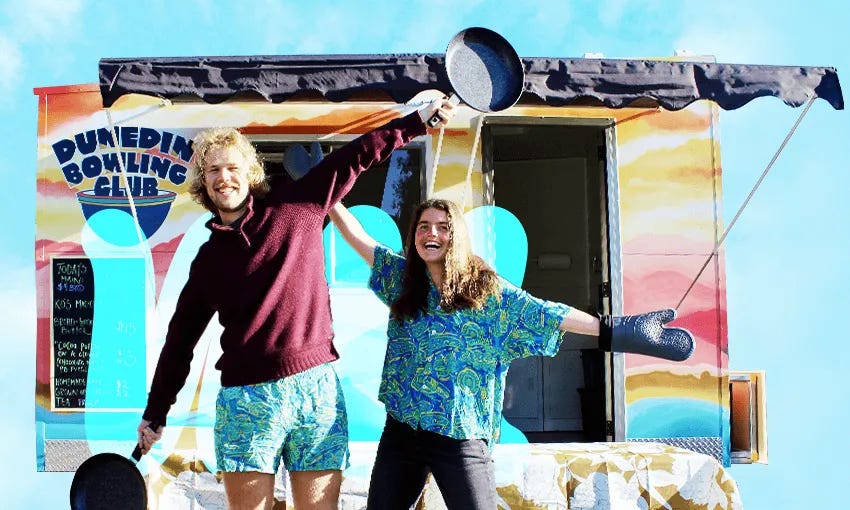The Prince and the future of constitutional monarchies
Prince Charles’s recent comments suggest he knows many countries may wish to become a republic, so should New Zealand start planning for it?
Mōrena and welcome to The Bulletin for Monday, June 27, by Anna Rawhiti-Connell. Presented in partnership with Z Energy.
In today’s edition: free flu vaccines for children aged 3-12; Paul Eagle confirms mayoral bid; fast food outlets and deprivation; but first, Prince Charles’ comments at CHOGM.
Prince Charles speaks during CHOGM opening ceremony (Photo: Dan Kitwood/Getty)
“It’s fine to ditch the monarchy”
At the opening address at the Commonwealth heads of government meeting (CHOGM) in Rwanda on Friday, Prince Charles told the assembled Commonwealth leaders that keeping the Queen as head of state or becoming a republic is “a matter for each member country to decide” and that such fundamental changes could be made “calmly and without rancour”. Britain’s ITV interpreted that as “Charles tells Commonwealth it’s fine to ditch monarchy”. The comments come after Barbados became a republic last November and other Caribbean countries like Jamaica signalling they are headed the same way.
Australia already making a start
Today on the Spinoff, Toby Manhire argues that the prince’s reputation for “meddling in political territories his mother studiously avoids” should ”jolt us onto the republican path”. He does give credit to the prince, referencing his comments at CHOGM, for knowing which way the wind is blowing. Australia has recently installed an assistant minister for the republic, who will lay the groundwork over the next three years to make sure the country is “ready to go in a second term of an Albanese government”. Peter Dunne has recently argued we should quickly follow Australia’s path. Like prime minister Jacinda Ardern, Australian prime minister Anthony Albanese is not at CHOGM this year. Both will be at the NATO summit.
The contrast between Matariki and the Jubilee
The republic debate comes around like Christmas, except maybe twice a year now. In March last year, after a flurry of media coverage around the Sussexs, Danyl Mclauchlan wrote that what we have isn’t broken and that a republic isn’t the answer to our problems. I thought this reflection from Stuff’s Laura Walters on the contrast between our recognition of the Jubilee and Matariki was thoughtful. I watched the excellent Matariki coverage on TVNZ on Friday and was surprised at how stirring I found the talk of nationhood. I also tuned into the Jubilee concert a few weeks ago and, yes, I loved the Paddington bear thing, but it really felt like a fun, slightly bonkers celebration of Great Britain more than anything else.
The election platform maths
As Manhire writes, there does seem to be some consensus that a republic will happen but we are consistently told “not now”, “not a priority” or “not an appetite from the public”. As Stuff’s Glenn McConnell writes, enthusiasm for the Jubilee seemed muted from all our political leaders. Ardern has said that New Zealand becoming a republic is likely to happen in her lifetime. Based on the PM’s (and my own) life expectancy, it would then need to happen in the next 40 years, or sometime in the next 13 election cycles before 2082 (based on a three-year term). If we assume a government gets two to three terms, one of the next four to six governments is going to need to make it part of an election platform. Given everything else that’s going on right now, kicking the can down the road might be a fair call, but if Prince Charles is anticipating a different future, we may need to do a bit more than that soon.
One of the world’s biggest names joined Tova O’Brien last week to talk about fame, the media and why Dunedin holds a special place in his heart. Ed Sheeran told O’Brien despite being one of the most recognisable singers in the world, he’s not had much trouble with the media. “They’re quite respectful if you are consistent. I have always been the same and just said ‘I want privacy’.”
Listen to the full interview on Today FM. (Sponsored)
Free flu vaccines for children aged 3-12
The government has announced this morning that they are widening the eligibility for free flu vaccinations from this Friday. It will mean an additional 800,000 New Zealanders are now eligible. The widening includes all children aged 3-12 and people with serious mental health or addiction needs. More than a million New Zealanders have already had a flu shot, but in acknowledging the significant pressure on the health system, health minister Andrew Little said “We’re ramping up efforts to get as many people vaccinated as possible.” A second Covid booster shot will also be available from Tuesday for everyone over the age of 50. It is recommended for anyone over the age of 65, as well as Māori and Pacific peoples older than 50 and people who are severely immunocompromised.
Paul Eagle confirms he will contest the Wellington mayoralty
Last Friday Toby Manhire asked the likely candidates for the Wellington mayoralty to get on with it and declare. The Dominion Post made a similar plea last week. At the time, only former Green party chief of staff Tory Whanau and a couple of rank outsiders had announced. This morning, Labour MP Paul Eagle heeded the call and announced he will stand. No word from incumbent Andy Foster yet. Eagle is currently the sitting MP in Rongotai. As reported by Stuff’s Tom Hunt, Eagle will run with the Labour party’s endorsement but as an independent. He will take three months of leave from parliament from July 8 to focus on his campaign. If Eagle wins it will trigger a byelection in his seat. As the Herald’s Georgina Campbell writes (paywalled) he hasn’t yet made a call on whether he would stand again for the Rongotai seat in next year's election even if he is unsuccessful in his bid to be mayor.
A vital message from The Spinoff’s publisher, Duncan Greive:
If you’re reading this, you’re hopefully getting value out of The Spinoff. Yet like many publishers, The Spinoff has suffered a significant drop in members, despite our costs continuing to increase. On one level I understand why our membership has dropped away. There’s a cost of living crisis, and inflation has made life hard for many of us. It’s totally normal to feel like you don’t need to support your local media organisation at a time like this.
The promise we’re making to you is that we’re actually better-suited to times like this than the pandemic itself. Our plan is to return to something more of what made us – coverage of culture, politics, te ao Māori and more with heart and humour. We will do that with features, essays and opinion pieces, but also podcasts, comics, video and newsletters. We are here to help walk you through this fascinating new era, and feel well-suited to being your guide.
But we can’t do it without you. The Spinoff has been cut out of the government’s enormous $100m plus Covid-19 campaign, which has been a boon to the big media companies and social media platforms. We returned the wage subsidy, unlike almost every other media organisation. The public interest journalism fund was narrowly targeted and is winding down. The big tech companies are refusing to do what they did in Australia and make meaningful deals with local media. And the recessionary drums continue to beat loudly, impacting the commercial spend we rely on, along with you, our members.
All of which is to say that we need your support more than we ever have. So please, if you can, click here to support The Spinoff by becoming a member today.
Fast food outlets most prevalent in areas of high deprivation
Stuff’s Sapeer Mayron and Hannah Martin have taken an empathetic approach to looking at the correlations between fast-food availability, deprivation, obesity and type two diabetes. Eftpos data, collated by the Helen Clark Foundation in partnership with Health Coalition Aotearoa, shows that areas of high deprivation in Auckland were the most concentrated markets for fast food suppliers based on the number of outlets, average sales, and sales per capita. They’ve spoken to Pasifika dietician Mafi Funaki-Tahifote who says she sees in her work how “those packed streets of food affect someone’s ability to kick their chicken-and-chips habit”. They also spoke to Boyd Swinburn, an expert on obesogenic environments, who says that fast food businesses prey on people who are both time-poor (because they’re working all hours of the day and night) and materially poor.
Hybrid workers “happiest”
AUT professor Jarrod Harr has been tracking the New Zealand workforce since February 2020. His most recent data deep dive found that hybrid workers, those who are splitting work time between the office and home, are the happiest. In the latest episode of When the Facts Change, he talks to Bernard Hickey about that and how work culture, pay, conditions and the power relationships between employers and employees have been transformed by the pandemic. Really recommend giving it a listen as they work through some of the findings in Harr’s research, why workers are still feeling insecure in their jobs and what employers can do about the great resignation.
Got some feedback about The Bulletin, or anything in the news? Get in touch with me at thebulletin@thespinoff.co.nz
Liam Arthur tells why he and his partner started a food truck in Dunedin where meals cost just $4; Emma Bartlett explains why she’s willing to pay out of pocket for a breast reduction; Duncan Greive shares five valuable business lessons gleaned from an unlikely source – comedian Leigh Hart; Chris Schulz discovers how Night ’n Day quietly became New Zealand’s third-largest grocery provider; and Alex Casey meets the 92-year old who owns 11,000 egg cups but is desperately seeking one in particular.
In cricket news…
I suspect the die-hard cricket fans that read the Bulletin are already up to date on the state of things. But if you need an update: England need 113 more runs for a clean sweep, three-test victory and have eight wickets in hand for the final day at Headingley.
The people’s champion
Stuff’s Sam Wilson and Mat Kermeen have penned an excellent four-part series on David Tua charting his rise to becoming one of our most successful boxers. They follow his fortunes over the years, including the management of his $20 million in career earnings, his struggles with depression and his current work mentoring and supporting young people, families and their communities in Onehunga.
Three reads on Roe v Wade
Like many people I watched the news breaking about the US Supreme Court overturning Roe v Wade on Saturday and instantly turned to the many US media outlets processing it in real time, prolifically and at great speed. Here’s a selection that gives some context to the decision, the implications and a suggestion of a way forward.
In the New York Times, Mary Ziegler details the recent history of the anti-abortion movement and the Republican party, saying “the decades-long fight to reverse Roe was not an effort to restore democracy but instead an attempt to change the way American democracy works.” Jia Tolentino’s essay for the New Yorker argues that the decision paves the way for increased surveillance and criminalisation of pregnancy. This was published in May by Helen Lewis in The Atlantic and is an assessment of the successful campaigns to decriminalise abortion in Northern Ireland and “repeal the eighth” in the Republic of Ireland, which ultimately led to the legalisation of abortion. She argues there are lessons for the US and that “activists need to go back to fundamental principles, and to do slow, careful movement-building that goes beyond marches and slogans.”












Have re signed up. Not sure when I last received a bulletin. Great read especially as I am not employed currently n canceled daily post subscription.